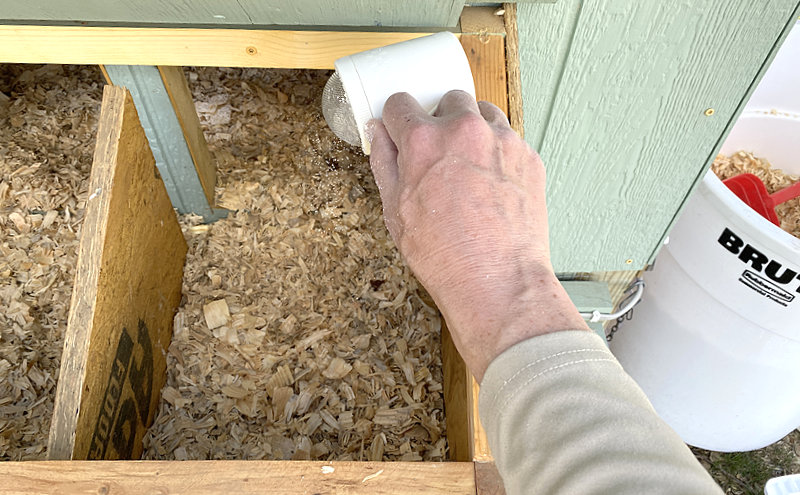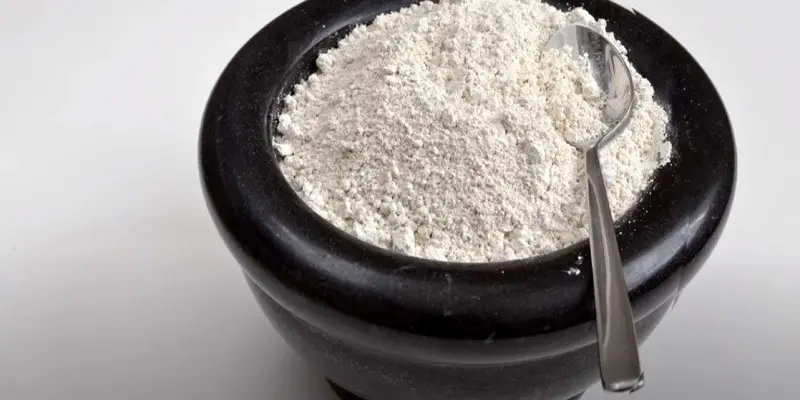Last Updated on December 9, 2023 by Pauline G. Carter
You should sprinkle diatomaceous earth in the chicken coop every few weeks to control pests and parasites. It is best to reapply after heavy rain or when the powder has been heavily disturbed.
Keeping your chicken coop clean and pest-free is essential for the health and well-being of your flock. Diatomaceous earth is a natural and effective way to control pests such as mites and lice. Regular application of diatomaceous earth can help prevent infestations and keep your chickens healthy.
By understanding the proper frequency for applying diatomaceous earth in your chicken coop, you can ensure a safe and comfortable environment for your birds. We will discuss the importance of using diatomaceous earth and how often you should apply it in your chicken coop to maintain a clean and healthy environment for your chickens.
Diatomaceous Earth
Diatomaceous earth is a natural and versatile substance that is highly beneficial for chicken coop maintenance. It is made from the fossilized remains of diatoms, a type of algae, and consists of silica, minerals, and other trace elements. This fine, powdery substance is well-known for its ability to effectively control pests and promote the overall health and hygiene of the chicken coop.
What Is Diatomaceous Earth?
Diatomaceous earth, often referred to as DE, is a soft sedimentary rock that is crushed into a fine powder. It is rich in silica, which gives it its abrasive and absorbent properties. DE also contains other minerals such as calcium, magnesium, and iron, making it a natural and safe option for pest control in the chicken coop.
How Does Diatomaceous Earth Work In The Chicken Coop?
When diatomaceous earth comes into contact with pests such as mites, lice, or fleas in the chicken coop, it works by dehydrating and damaging their exoskeletons. This leads to the eventual demise of the pests, effectively controlling their population without the use of harsh chemicals or toxins. Additionally, DE helps in preventing moisture buildup and odor control in the coop, creating a healthier environment for the chickens.
Importance Of Using Diatomaceous Earth In Chicken Coop Maintenance
Using diatomaceous earth in chicken coop maintenance is crucial for ensuring the health and well-being of your flock. Here are some key reasons why DE is an essential part of coop maintenance:
- Pest Control: DE effectively controls pests such as mites, lice, and fleas, which can cause stress and health issues in chickens.
- Odor Control: It helps in absorbing moisture and controlling odors, creating a more hygienic environment for the chickens.
- Safe and Natural: DE is a safe and natural alternative to chemical pesticides, minimizing the risk of exposure to harmful substances.
- Health Promotion: By controlling pests and maintaining cleanliness, DE promotes the overall health and hygiene of the coop and the chickens.
Regular application of diatomaceous earth in the chicken coop is essential to reap its full benefits and ensure the optimal health of your feathered friends.

Credit: modernsurvivalblog.com
Application Frequency Of Diatomaceous Earth
Keeping your chicken coop free from pests and parasites is crucial for the health and well-being of your feathered friends. Diatomaceous earth is a natural, organic solution that is widely used for pest control in chicken coops. Understanding the application frequency of diatomaceous earth is essential to ensure its effectiveness in combating pests while maintaining a safe environment for your chickens.
Factors Influencing The Application Frequency
Several factors can affect how often you need to apply diatomaceous earth in your chicken coop. These factors include the size of the coop, the number of chickens, the severity of pest infestation, and environmental conditions. Additionally, the type and quality of diatomaceous earth used can also impact the application frequency.
Recommended Frequency Of Applying Diatomaceous Earth In A Chicken Coop
The recommended frequency of applying diatomaceous earth in a chicken coop can vary depending on the factors mentioned earlier. In general, a thorough application every 1-2 weeks is advisable for effective pest control. However, during periods of heavy infestation or in humid environments, more frequent applications may be necessary to maintain pest-free conditions.
Signs That Indicate The Need For Reapplication
It’s important to be observant for signs that indicate the need for reapplication of diatomaceous earth in the chicken coop. These signs may include an increase in pest activity, such as mites or lice, despite previous applications. Additionally, environmental changes, such as heavy rainfall or high humidity, can reduce the effectiveness of diatomaceous earth, requiring more frequent reapplication.
Best Practices For Sprinkling Diatomaceous Earth
When it comes to maintaining a healthy chicken coop, incorporating diatomaceous earth into your regular routine can be highly beneficial. However, understanding the best practices for sprinkling diatomaceous earth is vital to ensure its effectiveness. From methods for spreading diatomaceous earth effectively to precautions to consider while applying it in the chicken coop, integrating this process with regular coop maintenance can contribute to a conducive environment for your feathered friends.
Methods For Spreading Diatomaceous Earth Effectively
Proper application of diatomaceous earth is crucial for its efficacy. Here are some methods to ensure an effective spread:
- Wear protective gear such as a mask and gloves to avoid inhaling the fine particles.
- Use a handheld duster or a sieve to evenly distribute the diatomaceous earth across the coop floor and nesting areas.
- Work in small sections, ensuring thorough coverage without excessive clumping or buildup.
Precautions To Consider While Applying Diatomaceous Earth In The Chicken Coop
While diatomaceous earth is a natural product, it’s essential to take precautions during application to protect both your chickens and yourself. Consider the following:
- Avoid applying diatomaceous earth on windy days to prevent inhalation of the fine particles.
- Keep your chickens away from the area being treated until the dust settles to prevent them from ingesting it.
- Regularly clean and replace bedding to maintain a dry environment, as diatomaceous earth is most effective when applied to dry surfaces.
Integrating Diatomaceous Earth Application With Regular Coop Maintenance
To ensure the consistent effectiveness of diatomaceous earth, consider integrating its application with regular coop maintenance. This can involve:
- Incorporating a monthly application of diatomaceous earth during routine coop cleaning and beddings change.
- Periodic inspection and reapplication of diatomaceous earth in areas prone to moisture or pest infestation.
- Maintaining a dry and hygienic coop environment to amplify the benefits of diatomaceous earth in pest control and overall coop health.
Monitoring And Assessing Effectiveness
When using diatomaceous earth in your chicken coop, it’s crucial to monitor and assess its effectiveness regularly. This involves observing its impact on chicken health, conducting periodic assessments of the coop environment for pest control effectiveness, and adjusting the application frequency based on the observed outcomes.
Observing The Impact Of Diatomaceous Earth Application On Chicken Health
Regular observation of your chickens is essential to assess the impact of diatomaceous earth on their health. Look for signs of improvement in their overall condition, such as reduced mite and lice infestations, healthier feathers, and increased activity levels. A healthy flock is a strong indicator of the effectiveness of diatomaceous earth.
Periodic Assessment Of The Coop Environment For Pest Control Effectiveness
Conduct regular checks of the coop environment to evaluate the effectiveness of diatomaceous earth in pest control. Look for signs of reduced pest activity, such as decreased presence of mites, lice, and other pests. Additionally, keep an eye out for any areas where pests may be hiding or breeding and address these issues promptly.
Adjusting The Application Frequency Based On The Observed Outcomes
Based on your observations, adjust the frequency of diatomaceous earth application as needed. If pest activity remains low and chicken health continues to improve, you may need to apply the diatomaceous earth less frequently. Conversely, if pest pressure increases or chicken health declines, consider increasing the application frequency to maintain effective pest control.
Frequently Asked Questions Of How Often Should I Sprinkle Diatomaceous Earth In Chicken Coop?
How Often Should I Apply Diatomaceous Earth In The Chicken Coop?
You should apply diatomaceous earth in the chicken coop every 1-2 weeks to effectively control pests.
What Are The Benefits Of Using Diatomaceous Earth In The Chicken Coop?
Using diatomaceous earth in the chicken coop can help control pests, parasites, and odors naturally.
Is Diatomaceous Earth Safe To Use Around Chickens?
Yes, diatomaceous earth is safe to use around chickens when applied correctly in the coop.
Can Diatomaceous Earth Harm Chickens?
When used properly, diatomaceous earth will not harm chickens and is safe for them.
How Does Diatomaceous Earth Help With Chicken Coop Cleanliness?
Diatomaceous earth helps keep the coop clean by controlling insects and absorbing moisture and odors.
Should I Sprinkle Diatomaceous Earth Inside The Chicken Feed?
No, diatomaceous earth should not be mixed directly with chicken feed as it can be harmful if ingested in large quantities.
Conclusion
Diatomaceous earth can be a useful tool for maintaining a healthy chicken coop. Applying it once a week can help manage pests and keep the coop clean. Remember to prioritize the well-being of your chickens when using diatomaceous earth, and always consult with a professional if you have any concerns.


